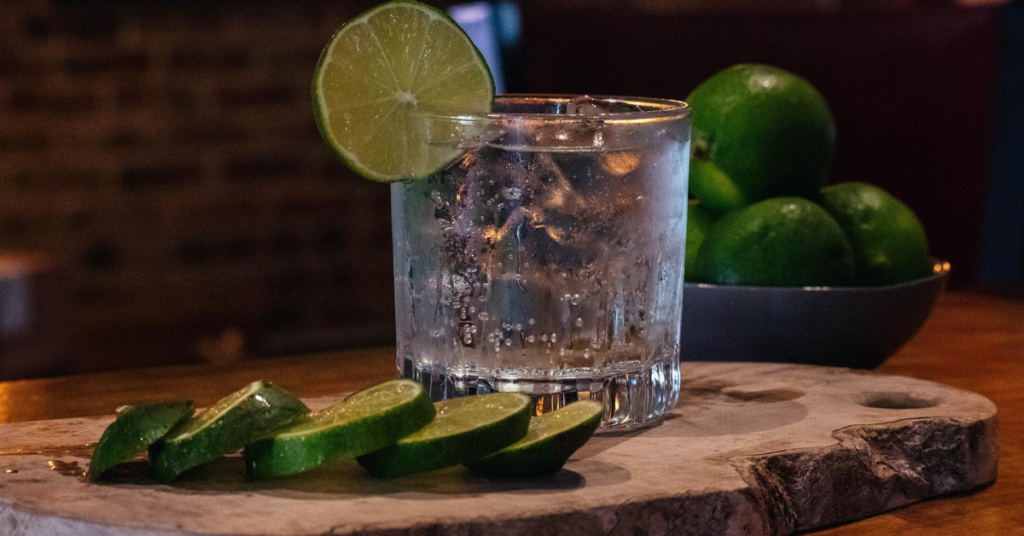Lebanon is known for its high-quality production of wine and arak, but recently, local-made liquors are conquering the Lebanese market. New brands of brandy, whiskey, gin, vodka, and rum, are taking over the market, replacing international brands with more affordable options.
It’s a time full of challenges, yet Lebanese producers are grabbing the opportunity of penetrating a new industry, innovating in flavors, branding, and production while also competing with international brands that have been there for decades.
A growing market for gin
Chief Product Officer at the Three Brothers Distillery, Chadi Tannous, mentions that their production of The Three Brothers Gin goes back to 2018, saying that the local gin scene started before the financial crisis in 2019. Between 2016 and 2017, International Wine and Spirits Registry, IWSR, reveals that global gin sales rose 7.4 percent to just under 35 million cases. The study records that the gin demand is predicted to be the second fastest-growing international spirit by 2021, coming directly after whiskey.
The reason behind this demand for gin goes back to several factors. According to Tannous, gin has the least calories among the white spirits – an advantage for today’s health-conscious consumer. Tannous confirms that local gin is indeed gaining market share in Lebanon and is becoming a more economically reasonable option for locals.
Award-winning flavors
The production of artisanal and craft gin falls well with the growing demand for authentically produced spirits, especially in Lebanon, where wine and Arak are considered an identity for this Mediterranean country. Juniper berries are the main botanical required to create gin—without which it cannot be categorized as gin. The Juniperus excelsa, ‘lezzeb’ in Arabic, grows in quantity on the western and eastern inclines of northern Mount Lebanon and is one of the main tree species in Lebanese forests, making the raw material abundant for gin production. Tannous claims that the berry’s quality is considered one of the best since it is given all the required natural variants. It is interesting to note that The Three Brothers won World’s Best Compound Gin from World Gin Awards for having a nose and palate hint at a very interesting and complex botanical make-up.
“Before distillation, alcohol production requires fermentation, where grains, vegetables, and fruits are placed together, opening the way for bacteria to react with sugars,” clarifies Jamil Haddad, the founder of Lebanese microbrewery Colonel Beer. Colonel is the first eco-friendly and independent microbrewery in Lebanon – a craft brewery that produces a wide variety of full-flavored beers before expanding its range of spirits to include gin, vodka, and rum. Haddad divides the production procedure into two schools. The first is the fermentation school, which includes beer and wine, and the second is the distilled, which provides for all the white spirits, such as rum, vodka, and gin.
Import substitution and export potential
Colonel Beer began producing Gin and Vodka a year and a half before Lebanon’s financial crisis. He describes the financial crisis’s impact as significant on local alcohol consumption. Colonel’s sales doubled after the economic collapse since people could not afford the international labels anymore. “Rather than paying 15 US dollars for a bottle of gin, you can have a tasty local gin that ranges between 3 to 5 US dollars. Pubs started using local Gin and Vodka in their pouring, while international brands became available only upon order.
Haddad faces many challenges when considering export: “Good quality and taste aren’t one, but the worldwide crisis, wars, and the Covid-19 pandemic are all reasons that produce hardships since the prices are unstable and the shipping cost is rising.” Additional obstacles amount to mismanagement in customs, the high shipping cost, taxes, and corruption make it harder to reach international markets. A simple yet significant challenge to him and other local alcohol producers is the access to quality glass bottles. There is no glass bottle manufacturer available in Lebanon, so importing the bottles is essential. Haddad encourages a ‘refill your bottle’ policy at the brewery to cut costs and reduce waste.
Haddad observed the booming of the world gin market in 2013, a trend that ultimately reached the Lebanese market and altered the preferences of younger consumers. “They still drink arak and wine, but they also like white alcohol and consume it a lot.” This shift ignited Haddad’s curiosity to explore gin production in his brewery. “I saw that the gin drinking trend would invade Lebanon, so why not produce our own and master it like any other product? The financial crisis led to a boom in production and the emergence of new brands offering multiple price points and different levels of quality.”
Social and environmental impact
Co-founder and Communication Director at Rechmaya Distillery, Maya Khattar, confirms that their goal since day one was to have a high-end product, not a commercial one. “In Rechmaya, the distillery is entirely eco-friendly, starting from the recycled water that is being used, moving to the solar panels that supply the project with the needed electricity, alongside turning the waste into compost at the end.”
Rechmaya Distillery exports its products to the USA, UAE, Germany, and Cyprus. Khattar confirms that the process was easier than expected: “The process differs from the agri-food sector, since gin has a long shelf-life, and the alcohol sector differs from the fresh or frozen food exporting process in the reduced complexity of required papers .” With this project, Maya’s main focus from producing alcohol was to open job opportunities for the youth and revive the region of Rechmaya. The distillery helped turn Rechmaya into a destination for people from all over Lebanon. Khattar mentions the new commercial spaces opening near the distillery and increased job opportunities, especially for the youth of the area.
Lebanon is notorious for its diversity and zest for life, a culture common to every region in Lebanon and every Lebanese in the country and abroad. A renowned cuisine accompanied with wine, arak and now liquors are part of its mixed heritage – different tastes that are all a product of a rich land and its very innovative people.







